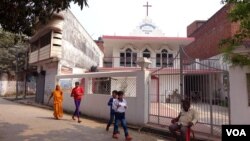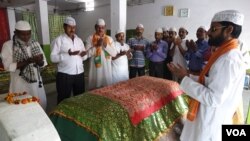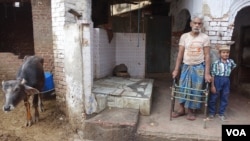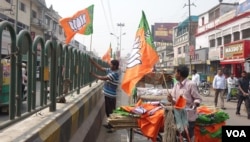Muslim and Christian leaders in India are expressing concern over what they call a sudden rise in sectarian attacks against their communities across the Hindu-majority country.
The minority community leaders have said the hate attacks, for which they blame right-wing Hindu groups, spiked with recent assembly election victories in Uttar Pradesh state by India's ruling party, the Hindu nationalist Bharatiya Janata Party (BJP).
Noting that most of the anti-Muslim and anti-Christian attacks are taking place in the BJP-ruled states, the leaders accuse the local governments of not taking punitive actions against the perpetrators.
One such attack occurred this month in Uttar Pradesh when Hindu activists barged into a church in Maharajganj district, confronting a congregation of 150 people and accusing them of secretly converting Hindus. After threatening to kill the pastor and demolish the church, the group left when police arrived.
"There is a very sharp rise in violence against Christians and also Muslims in the days since Yogi Adityanath has become the chief minister of the state of Uttar Pradesh," John Dayal, spokesman of United Christian Forum, a New Delhi human rights group, told VOA.
Zafarul Islam-Khan, a New Delhi Muslim community leader, said the hate attacks against minorities by Hindu right-wing groups were rising with the growth of the BJP in the country.
"BJP-led governments at the center and the states do not take action against the Hindutva groups because they are responsible for establishing the powerful Hindu vote bank for the party. People from these groups are becoming ministers and [legislators] in the party," Khan told VOA. "So, they are part of the family, and that's why BJP in different states cannot take any action against these Hindutva groups."
Rights group critical
New York-based Human Rights Watch this week condemned India's Hindutva group cow vigilantes — those who perpetrate violence in the name of protecting cows, which Hindus consider sacred — for targeting Muslims in attacks.
"Self-appointed cow protectors driven by irresponsible populism are killing people and terrorizing minority communities. The government should condemn this violence and take prompt action against those responsible for these attacks or face allegations of complicity, " Meenakshi Ganguly, the rights group's South Asia director, was quoted saying in the report.
In India, where Muslims and Christians constitute 14.2 percent and 2.3 percent of country's population, respectively, the two communities have long alleged varying levels of persecution.
The religious minority communities identify the right-wing Hindu organization Rashtriya Swayamsevak Sangh (RSS); India's largest Hindu religious group, Vishwa Hindu Parishad (VHP); and dozens of their offshoots as the perpetrators behind most of the persecution and violence.
These groups, which are pushing the Hindu-first policy and are aiming to turn constitutionally secular India into a Hindu nation, are known as Hindutva groups.
Muslim and Christian community leaders insist that although the Hindutva wave targeting the minorities began sweeping the country around the time Narendra Modi was elected prime minister in 2014, the two communities have begun facing a new wave of sectarian attacks following BJP's victory in three states, including Uttar Pradesh, last month.
Allegations have surfaced that, soon after Adityanath, a hard-line Hindu religious leader, was installed as the chief minister of Uttar Pradesh, Hindu Yuva Vahini (HYV), a private Hindu militia set up by him, began attacking Muslims and Christians in the state.
"After Yogi became the chief minister of Uttar Pradesh, Muslims were asked by the HYV activists to leave at least two Hindu-majority villages of the state to make them Hindu-only villages. In another Hindu-majority village in Hapur [in Uttar Pradesh], HYV men thrashed Muslims and warned against wearing Muslim skullcaps in public. Some village mosques were even warned not to give Azan [call for prayer]," Aziz Mubarki, national secretary of South Asia Ullema Council, a body of Islamic clergies, told VOA.
Reports denied
Rajesh Rai, chief of HYV in Adityanath's hometown of Gorakhpur, Uttar Pradesh, said charges that the Hindutva groups are targeting minorities in hate attacks are false.
"All those charges are baseless. The church leaders visit the villages, gather the young people and entice them through many allurements. They also offer the poor people money for purposes like medical treatment and also to manage their families. This way gradually they make them change their faith," Rai told VOA.
He also accused Christian missionaries of engaging in "deceitful and forcible conversions" across the country and said that their activists would continue action to stall all conversions to Christianity.
But Bhopal church leader Father Anand Muttungal rejected such assertions.
"Christians live as a very microscopic minority in the villages dominated by the Hindu community," he said. "It's impossible to deceitfully or forcibly convert any Hindu to Christianity. The charges against the churches by the RSS and other Hindu outfits have been there for 25 or 30 years. But till today, not even in a single charge has been proved in any legal system of the country."







